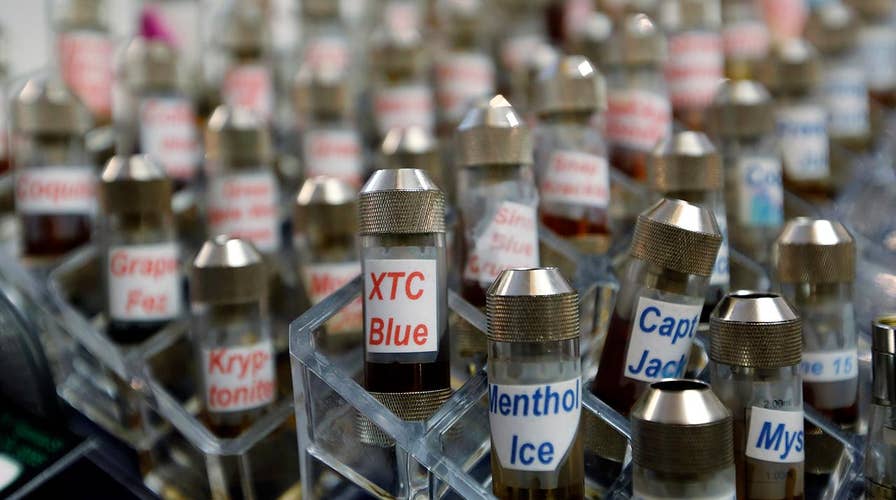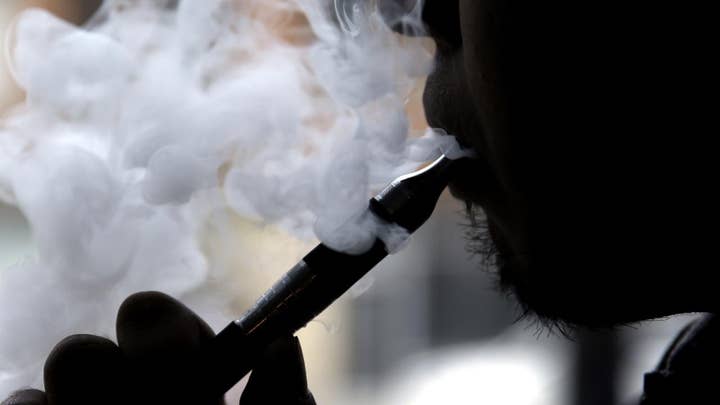FDA considering flavored e-cigarette ban
Food and Drug Administration says e-cigarette use among youth has hit epidemic proportions; reaction from Dr. Marc Siegel, professor of medicine at NYU's Langone Medical Center and a Fox News contributor.
U.S. health officials are sounding the alarm about teenage use of e-cigarettes, calling the problem an “epidemic” and ordering manufacturers to reverse the trend or risk having their flavored vaping products pulled from the market.
The warning from the Food and Drug Administration on Wednesday cited recent data pointing to a sharp rise in underage use of the devices, including Juul, Vuse and others.
It marks a shift in the agency’s tone on e-cigarettes. Since 2017, FDA commissioner Scott Gottlieb has discussed e-cigarettes as a potential tool to ween adult smokers off cigarettes, although that benefit hasn’t been proven.
But Gottlieb said in an address at FDA headquarters that he failed to predict the current “epidemic of addiction” among youth, mainly driven by flavored products.
“The disturbing and accelerating trajectory of use we’re seeing in youth and the resulting path to addiction must end,” Gottlieb told agency staffers and reporters.
The FDA said it remains committed to exploring e-cigarettes as a less-harmful alternative for adult smokers, but Gottlieb added “that work can’t come at the expense of kids.”
E-cigarettes are vapor-emitting devices that have grown into a multi-billion dollar industry in the U.S. despite little research on their long-term effects, including whether they are helpful in helping smokers quit. They’re generally considered a less dangerous alternative to regular cigarettes. But health officials have warned nicotine in e-cigarettes is harmful to developing brains.
They typically contain nicotine, and sometimes flavorings like fruit, mint or chocolate.
Health advocates have worried about the popularity of vaping products among kids and the potential impact on smoking rates in the future. A government-commissioned report in January found “substantial evidence” that young people who use e-cigarettes are more likely to try cigarettes.
Gottlieb cited unreleased federal figures that he says will be made public in coming months.
“We didn’t foresee the extent of what’s now become one of our biggest challenges,” he said, in prepared remarks. “Hindsight, and the data that’s now available to us, fully reveal these trends.”
In June, a government survey found teen vaping seemed to be holding steady last year. Some experts were cautious about the results, however. They noted the survey did not ask specifically about Juul, a sleek, heavily-marketed e-cigarette brand that exploded onto the market and accounts for 70 percent of U.S. sales, according to analyst estimates.
“I think it became clear to FDA that if they didn’t get their arms around this issue the use of these products by kids across the nation would undo decades of progress,” said Matthew Myers of the Campaign for Tobacco-Free Kids. His group and several others are suing the FDA over a decision to delay federal review of most e-cigarettes.
Under regulations developed by the Obama administration, manufacturers were supposed to submit most products for review by August 2018. But last year Gottlieb delayed the deadline until 2022, saying both the agency and industry needed more time to prepare.
The decision was criticized by anti-smoking advocates who say e-cigarette makers are targeting kids with candy flavors and marketing that portrays their products as flashy, hand-held gadgets.
Under Wednesday’s announcement, the five largest e-cigarette manufacturers will have 60 days to produce plans to stop underage use of their products. The companies sell Vuse, Blu, Juul, MarkTen XL, and Logic e-cigarette brands, which account for 97 percent of U.S. e-cigarette sales, according to FDA.
If the plans fall short, the FDA could block sales of the products by enforcing a requirement that companies provide detailed design and health data about their products before marketing them. The FDA’s delay on that requirement has allowed the industry to flourish with little oversight. But it’s not clear how quickly the decision could be reversed.
Wells Fargo analyst Bonnie Herzog said Juul is the brand “most at risk” from an FDA crackdown and that a potential ban on the company’s products would boost Altria and other cigarette makers that also sell e-cigarettes.
Shares of Big Tobacco companies surged in trading Wednesday. Altria Group Inc. and British American Tobacco Plc had the biggest one-day percentage gain in about a decade.
San Francisco-based Juul said it is working to prevent underage use of its products but added that flavors can help adult smokers quit.
“By working together, we believe we can help adult smokers while preventing access to minors,” the company said in a statement.
The FDA also announced 1,300 warning letters and fines to online and traditional stores that have illegally sold Juul and other e-cigarettes to minors. Regulators said it was the largest coordinated crackdown in the agency’s history.
The FDA is in the process of rolling out a sweeping anti-smoking initiative designed to make it easier for smokers to quit by cutting the nicotine levels in regular cigarettes. As part of that plan, Gottlieb has suggested some smokers could be directed toward alternative products that deliver nicotine without the carcinogens of cigarettes. Those products could include e-cigarettes, though the FDA has not given any company permission to advertise its device as a quit-smoking aid.
On Wednesday, Gottlieb criticized e-cigarette companies’ handling of the underage use problem, saying they approached it as “a public relations challenge rather than seriously considering their legal obligations.”
“I’m here to tell them today that this prior approach is over,” he said.









































